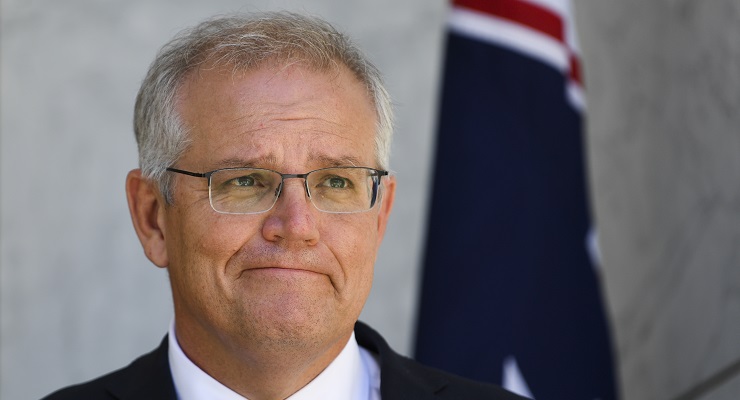
When Crikey decided to detail Scott Morrison’s habit of lying back in May, there was some concern. Could we really call the prime minister a liar? Lawyers were consulted; the dossier we’d put together was double and triple-checked. We styled ourselves as rather bold in bluntly using the L-word about the man tasked with running the country.
Six months later things were very different. It was not merely possible but fashionable to label Scott Morrison a liar, having become the height of chic among the French. Malcolm Turnbull then joined Emmanuel Macron: “He’s lied to me on many occasions,” Turnbull said. “Scott has always had a reputation for telling lies.”
Morrison didn’t help himself when, on his first outing after returning from Glasgow, where he worked hard to derail international climate policy, he tried to claim he supported electric vehicles — the subject of one of his most memorable lies during the 2019 election campaign. He then claimed it was a “Labor lie” that he’d lied. Within days he was being asked by Neil Mitchell if he’d ever lied in public life. No, he hadn’t, Morrison declared — to general hilarity.
It was a vivid illustration of how Morrison lies more and more when he’s under pressure. That he was under pressure for lying lent the political equivalent of a hall of mirrors to proceedings.
Since May, Morrison has racked up 17 more lies. Crikey’s book on the topic, Lies and Falsehoods, has an appendix of lies that was out of date even as it went to print. The book sold out its print copy in about a week, and continues racking up strong sales in its online edition, suggesting that Morrison’s lying is no longer a matter of inside-Canberra fascination but one that resonates more broadly with the public.
What continues to impress about Morrison’s lying is the sheer lack of necessity of many of them.
No one forced him to lie about telling Anthony Albanese he was going to Hawaii, or that Christian Porter had said how much money he’d received from anonymous donors, or that Albanese had “backed in China”, or made him change his story about the submarine contract with Naval Group. And yet he continues to utter them, even while knowing he is increasingly regarded in the electorate and by journalists as a liar.
By the end of the parliamentary year, even his own backbenchers no longer trusted his words.
It’s one thing to lie about your opponents. It’s quite another to tell everyone that what you said last week, or last year, simply never happened.








No Bernard, when “…asked by Neil Mitchell if he’d ever lied in public life. No, he hadn’t, Morrison declared…” he did NOT say that.
He, very carefully, said, “No, I don’t believe I have.” as reported in …err, this ezine.
Accuracy is important, ever more so in this post truth political environment.
Yep, it’s pathological – he absolutely enjoys the feint and parry of it all.
He just can’t help himself. And like every good (bad) liar, he has to keep telling more lies to cover up the lies he forgot he told last week. I just hope that the public see through them come election time.
Very generous – “…the lies he forgot he told last week“!
Try the day before or even, when he’s really under pressure, the previous sentence.
For so many reasons Morrison is not fit to be the PM of Australia. That he is a pathological liar is amongst the biggest.
He has no idea what real leadership is, has no intention of self discovery, and hopes the electorate is dumb enough to fall for his lies and spin again.
His inability to see what was coming with Covid 19, his determination to open at all costs, shows a man with no judgement.
Morrison simply does not care about anybody but himself, and members of his religious sect.
He is a danger to the well being of us all, and should be removed from office by the electorate in a manner similar to what has happened in WA.Done and dusted for decades.
If a Labor government performed like the LNP for the last 9 years, then yes, decades. But not with the LNP, not in Australia.
If the average Aussie, when woken from a coma, was asked, “quick, the polls are almost closed, no time for any news, who do you vote for” the answer will more than likely be LNP.
That’s how it is in Australia, which is interesting, because all of the attributes of Australia that we like to see ourselves as, larrikins, friendly, generous,
givers of a fair go; these are not LNP attributes.
Mr Morrison’s lying character is spreading amongst the PMO also.
To be a successful liar you need to have a very good memory. Or not care.